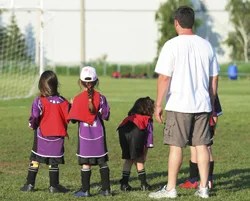Congratulations. The sparkle in your eye has become a child athlete! As a result, your parenting responsibilities have ballooned. You have taken your role as bus driver, mobile disc jockey, cheerleader, and magician in the kitchen to new levels. Even the way you communicate with your child has changed. If, for example, you are working with a more seasoned athlete, you may have already advanced to shouting parent-worthy reminders like, “Do not walk outside with wet hair, you are going to catch pneumonia!” (This was a personal favorite of my Mother’s).

Athlete or not, as a child’s aspirations grow, so, too, do parenting responsibilities. Research has shown that most parents are unaware of how many additional responsibilities they take on when their child becomes active in sports. A go, go, go cheer automatically awards you the title of being your child’s biggest fan; but a go, go, go lifestyle can leave you too tired to get the words out. As hard as you try, sometimes it’s difficult to prevent the stress of your busy, adult lifestyle from interfering with your efforts to be your child’s biggest fan. Beware at these times. How you support your little athlete can go from healthy to unhealthy encouragement — often without your realizing it. Don’t let the stress of your day cause you to become, in your child’s mind, his or her worst nightmare. Start by knowing the warning signs.
Researchers from the University of West Virginia and Southern Connecticut State University have identified five different ways parents provide unhealthy encouragement to children in sports:
1. Quick to criticize and slow to praise
2. Selectively shows love, support, and approval based upon the child’s performance
3. Becomes cold and critical when the child fails to live up to expectations
4. Lives out athletic aspirations through the child
5. Encourages the child to mimic the training habits or skills of professional athletes
Children are impressionable. If you want to be your child’s biggest fan take a bird-on-the-shoulder approach. This is a discrete approach to parenting that focuses on working at his or her own pace; listening; guiding; and assisting your child throughout their development as an athlete. If it hasn’t happened already, you will, inevitably, need to help your child work through the physical, psychological and emotional stresses related to sports. When your child can freely turn to you without repercussion, you will share with your child all the gifts and life lessons that sports have to offer.
The bird-on-the-shoulder approach is a healthy replacement to the win-at-all-cost bulldozer approach, which finds parents becoming overbearing, controlling, and manipulative of their child. Do not let the social pressures to win happen at the expense of your child. Learn to truly be your child’s biggest fan. Think of yourself as a birdie instead of a bulldozer.
Here are five healthy ways researchers suggest encouraging your child in sport:
1. Emphasize fun and participation
2. Define winning as a level of effort, not the score of the game
3. Measure improvement of skill, not by comparison to other children
4. Maintain open communication with the child throughout the sports experience
5. Let the child experience the dynamics of sport at his or her own pace
Finally, as your child’s biggest fan, SMILE. Your child works hard every day to make you proud. A smile can impact a child in ways that you may never have thought of, by inspiring an inner strength and helping fuel a maximum effort.
BRAD KAYDEN is a Child Wellness Advocate who consults in the areas of creativity, leadership and group development. He is a Youth Sports Instructor, specializing in athletic programming for kids 10 and under. His pro-sport platform educates parents on the culture of youth sports and teaches how athletics translates into life skills for children.





















